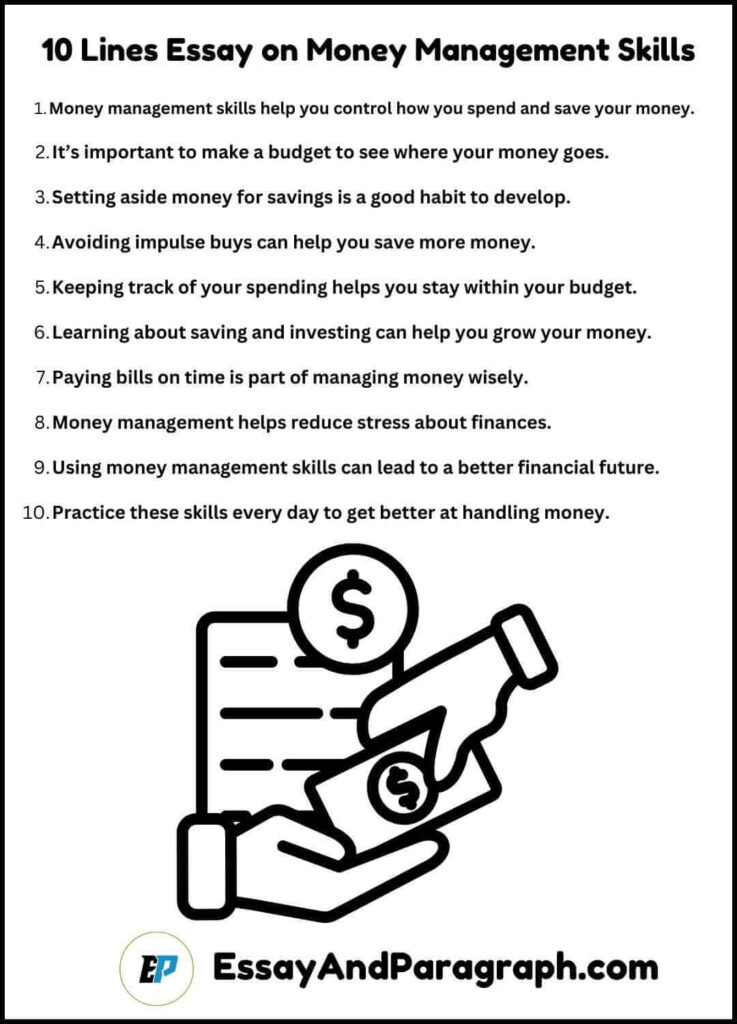Have you ever wondered how some people are always good at saving money, while others struggle? Money management skills are the key to making sure you can handle your money wisely. These skills help you understand how to spend, save, and invest your money in a way that will keep you financially secure. Managing money well isn’t just for adults; even young students can start learning these important skills. In this article, we will learn how to write an essay on money management skills and explore simple steps to become better with money.
10 Lines Essay on Money Management Skills
- Money management skills help you control how you spend and save your money.
- It’s important to make a budget to see where your money goes.
- Setting aside money for savings is a good habit to develop.
- Avoiding impulse buys can help you save more money.
- Keeping track of your spending helps you stay within your budget.
- Learning about saving and investing can help you grow your money.
- Paying bills on time is part of managing money wisely.
- Money management helps reduce stress about finances.
- Using money management skills can lead to a better financial future.
- Practice these skills every day to get better at handling money.

Short Essay on Money Management Skills
Money management skills are important for everyone, even students. These skills help you handle your money wisely, so you can save for things you want and avoid running out of money. The first step in managing money is making a budget. A budget helps you understand how much money you have and how much you can spend. By tracking your expenses, you can avoid spending more than you earn.
Another important skill is saving money. It’s a good idea to set aside some of your money for savings, so you can use it later for important things. One way to save is by paying yourself first—this means saving money before spending it on anything else.
Money management also involves making smart choices about spending. Sometimes, it’s easy to buy things on impulse, but those purchases can add up quickly. Instead of buying things you don’t need, think carefully about each purchase. Over time, this will help you save money.
By learning money management skills, you can create a solid financial foundation for your future. These skills help you make good choices about how to use your money, reduce stress about finances, and even plan for things like college or a car. The earlier you start practicing money management, the better off you’ll be in the long run.
Long Essay on Money Management Skills
Money management skills are essential for building a strong financial future. These skills help you manage your income, spending, and savings in a way that ensures you don’t run out of money when you need it. Whether you are a student or an adult, managing money wisely is crucial for reaching your financial goals.
The first step in money management is creating a budget. A budget is a plan for your money, showing how much you earn and how much you spend. By keeping track of your income and expenses, you can see where your money goes each month. This helps you identify areas where you may be overspending and find ways to save. For example, if you’re spending a lot on snacks, you can try cooking at home instead to save money.
Another key skill is saving money. It’s important to set aside a portion of your income for the future. One of the best ways to save is by paying yourself first. This means putting some money into savings before spending it on anything else. Even small amounts of savings add up over time, and they can help you pay for things like emergencies or future goals.
In addition to saving, managing money also means making smart spending choices. Sometimes, we buy things on impulse without thinking about whether we really need them. But by planning ahead and sticking to your budget, you can avoid these impulse purchases. This will help you spend only on things that are necessary and that fit within your financial plan.
Managing money also involves setting goals and planning for the future. For example, you might want to save for college, a vacation, or a car. Setting specific goals helps you stay focused and motivated. When you know exactly what you are saving for, it’s easier to make decisions about how to spend your money.
Lastly, being financially responsible means understanding the value of investing. Once you have saved some money, learning about investing can help you grow your wealth. Investing can involve putting money into things like stocks, bonds, or a savings account that earns interest. While it can be risky, it can also lead to greater financial rewards in the future.
In conclusion, money management skills are important for students and adults alike. By budgeting, saving, making smart spending choices, and planning for the future, you can manage your money wisely and build a secure financial future. These skills not only reduce financial stress but also help you reach your goals faster. The earlier you start learning and practicing money management, the better prepared you will be for the future.
FAQs
1. What are money management skills?
Money management skills are the abilities that help you handle your money wisely. They include budgeting, saving, spending wisely, and investing. Learning these skills helps you avoid overspending and ensure you have enough money for the things you need.
2. How can I start managing my money better?
To start managing your money better, begin by creating a budget. Track your income and expenses to see where your money goes. Then, make a plan to save some money each month. Avoid impulse buying and focus on making smart choices with your spending.
3. Why is saving money important?
Saving money is important because it helps you prepare for the future. You never know when an emergency might happen, and having savings can protect you from financial stress. Saving also helps you reach long-term goals, like buying a car or going to college.
4. How can I avoid spending too much money?
To avoid spending too much money, make a budget and stick to it. Track your expenses and identify areas where you can cut back, like eating out or buying things you don’t really need. Being mindful of your spending will help you save more money in the long run.
5. What is the best way to learn about investing?
The best way to learn about investing is by starting small. Read books or articles, watch videos, or take courses to understand the basics of investing. You can also talk to a financial advisor to learn more about how investing works and how it can help you grow your money.
Top 5 Quotes on Money Management
- “A budget is telling your money where to go instead of wondering where it went.” – Dave Ramsey
- “Don’t save what is left after spending, but spend what is left after saving.” – Warren Buffett
- “The goal isn’t more money. The goal is living life on your terms.” – Chris Brogan
- “Money is a terrible master but an excellent servant.” – P.T. Barnum
- “An investment in knowledge pays the best interest.” – Benjamin Franklin
Summary on Money Management Skills
Money management skills are essential for making good decisions about how to spend, save, and invest your money. By budgeting, saving regularly, and making smart purchases, you can build a strong financial foundation for the future. These skills not only help reduce financial stress but also allow you to achieve your long-term goals. Practicing good money management early in life helps ensure that you are prepared for whatever financial challenges come your way.











